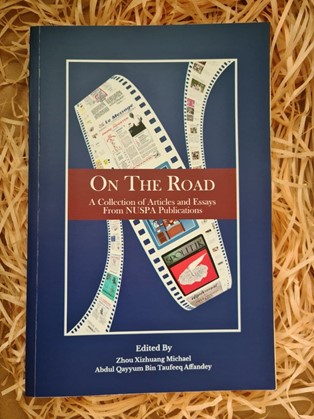On The Road: A Journey on Singapore’s Transformation Through Time
Singapore has come a long way economically, socially, and politically. Our transformation from a humble settlement to a global trading hub, the building up of harmonious racial and religious ties amongst our people, and the inclusion of more diverse voices in our parliament are just some of the achievements we have amassed over the years. As we face the future, it is imperative to look back on our past to draw lessons on how we should tackle current and future challenges. The world is ever-changing, and issues like climate change, technological disruption, and most recently, the pandemic, are all important areas of concern, among many others.
With that in mind, the NUS Students’ Political Association (NUSPA) aims to shed light on Singapore’s historical development through their latest publication. On The Road: A Collection of Articles and Essays From NUSPA Publications features articles and essays from students, past and present, as well as contributions from academic professors and interviews with politicians from both the ruling party and the opposition.

The book, launched on September 30, 2021, in commemoration of NUSPA’s 45th anniversary, contains a selection of works from NUSPA publications since the 1980s. It was edited by Zhou Xizhuang Michael, the 46th NUSPA President and founding Editor-in-Chief of The Convergence, and Abdul Qayyum Bin Taufeeq Affandey, the current NUSPA Vice President (Policy).
Each chapter in the book focuses on a theme, such as politics, society, and the COVID-19 pandemic. In the following section, I will share my takeaways from some of the essays.
Talking politics, societal phenomena, and the COVID-19 pandemic
The politics chapter discusses a myriad of topics, from more serious issues like how Singapore can manage the volatile US-China relations, to how seemingly harmless activities like the proliferation of memes can influence politics.
First-time voters like myself will resonate with one of the articles about youth voters’ perspectives on politics as it is comforting to know that we share similar thoughts on the heavy but necessary responsibility put upon us in choosing our next leaders. Interestingly, the chapter also features an opinion poll conducted with undergraduates in 1991 on their views about the General Election that year, which helped me gain more insight into the political sentiments back then, such as those about the opposition, and draw a comparison between then and now.
In the societal aspect, the next chapter discusses social issues that are very current today. One important question I was excited to learn about is how does the minimum wage (MW), which has been advocated for in Singapore for almost two decades, compare against the progressive wage model (PWM) currently used. The underlying motivation for the MW is to ensure those in the lowest percentile of salary ranges are able to earn a more decent living wage, hence improving equality. In the article, “Minimum Wage is a Rung, but the Progressive Wage Model is a Ladder”, the PWM is argued to be better at fostering “sustainable economic growth” by encouraging workers to upskill and in turn earn higher wages. However, the PWM still has limitations in reducing inequality, and only time will tell if it is indeed a better model for society.
Another essay that I enjoyed reading a lot, titled “Avoiding the Trap Cycle of ‘OK Boomer’ Phenomenon in Singapore”, talked about how nowadays, many youths are using the catchphrase “OK boomer” on the older generation so often that it has become almost synonymous with our perceptions of them. I completely agree, and I feel it is important that we stop and think how this negatively affects our perceptions of the elderly as it risks us having a blanket prejudiced stereotype on all of them. When we sarcastically use the phrase to dismiss them, we are not trying to understand them better, leading to a widening generational gap.
In addition, the chapter also helps in documenting the temporal change on the topic of female political representation in Singapore through two essays, one written in 2002 and the other written in 2021, by the same author. Over the years, there has been increased female political representation, likely due to rising preferences for more diverse voices and women being increasingly better educated. While there is still room for improvement on the gender equality front, this is definitely an encouraging trend!
Finally, with the pandemic being the talk of the town for almost two years now, this was an inevitable topic, and I especially liked the personal stories from our fellow students about their experiences getting called back from their overseas exchange programmes, as well as the sharings from some fresh graduates on how they are looking for employment amidst the economic repercussions of the virus. We have all heard about the “new normal”, but what exactly does it entail for all of us in different ways?
Most interestingly, one of the articles titled “Compare, Contrast and COVID-19: Singapore VS Sweden”, written by an undergraduate in Sociology and Communications, draws a comparison between the approaches of Singapore and Sweden in managing the pandemic based on the countries’ different characteristics. While our government has mandated mask-wearing and enforced social distancing rules, the Swedish government has entrusted social responsibility on their people and left it largely to them to decide if they want to wear masks or even quarantine themselves should they suspect themselves to have the virus. Through the article, I had a clearer understanding of how culture plays a huge part in explaining why societies act the way they do and how different approaches can still yield similar results.
Learning more about Singapore’s development through insightful pieces
In ending, I thoroughly enjoyed reading the book as it enabled me to gain insights about how the sentiments of Singaporeans have changed over the years and what are some of the challenges we face today. My favourite part of the book was how it consisted of content and interviews done as far back as the 1980s, helping me to visualise what Singapore was like back then, especially in the political scene!
It was admirable to read the many well-developed and insightful commentaries about various social, political, and economic issues from students like myself. I have learnt much from the book as the articles have explained the various complicated issues we face as a society today clearly, and I believe these can be channelled further into productive discourse. Learning from the past, having open and constructive discussions, and collectively tackling the challenges we face — all of these will definitely help us on our road to progress in future.
If you are interested to read more, the book is available from the NUS Co-op in the Central Library!
By: Daphne Yow
